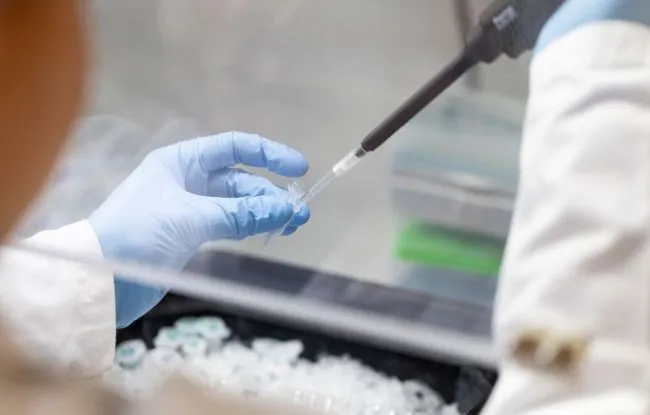This study published in the PNAS provides insight for new therapeutic strategies against triple-negative breast cancer.
Tumors secrete extracellular vesicles that are known to contribute to interactions between the immune system and cancer cells. Using a novel protocol, Mercedes Tkach from the “Extracellular vesicles, immune responses and cancer” team led by Clotilde Théry (Immunity and Cancer unit, Institut Curie/Inserm), managed to separate the vesicles from the other components secreted by the cancer cells. This allowed them to specifically study the interactions of these vesicles with monocytes, these immune system cells that become macrophages when they enter the tissues.
Macrophages are present in large numbers in tumors and their population is heterogeneous. We have observed how monocytes behave, survive, and transform into macrophages. Our aim was to find out whether extracellular vesicles secreted by triple-negative breast cancer tumor cells could be responsible for the formation of some of these macrophages,
explains Clotilde Théry.
An unexpected macrophage sub-population
There has been a surprising discovery, as scientists from Institut Curie have shown that macrophages that have “met” with extracellular vesicles have an unusual gene expression profile different from that of other macrophages, whose properties are known to be pro-tumor.
For the first time, researchers have discovered a molecule on the surface of the extracellular vesicles secreted by the triple-negative cancer (TNBC) cells, known as CSF1 (for Colony Stimulating Factor 1) which is a growth factor. The extracellular vesicles in contact with the monocytes via CSF1 allow not just the survival of monocytes but also direct their differentiation towards macrophage sub-populations with somewhat pro-inflammatory and possible anti-tumor characteristics (partly through activation of the cGAS-STING signaling pathway).
Additionally, a single-cell RNA-seq data analysis conducted on myeloid cells from triple-negative breast cancer tumors in collaboration with the team of Emanuela Romano, medical director of Institut Curie’s cancer immunotherapy center, revealed the presence of this same gene expression signature in triple-negative tumors.
By correlating patient survival with the expression of the gene signature that we had identified, we found that survival improved when the expression of the signature genes of these extracellular vesicle-induced macrophages was stronger. Naturally we need to continue to study this but these results open up possibilities for new therapies that could exploit or promote the presence of these extracellular vesicle-induced macrophages to promote anti-tumor responses,
concludes Clotilde Théry
The expertise developed by Clotilde Théry’s team in conducting this study enabled us to set up a platform devoted to extracellular vesicles in 2021 at Institut Curie. This platform, along with a new “structuring” project initiated by these results, in collaboration with the “Non-coding RNA, Epigenetics, and Genomes Fluidity” team headed by Antonin Morillon at Institut Curie, and focusing on the action mechanisms on macrophages and the molecules contained in the vesicles, are now supported by Institut Curie.
These discoveries are the subject of a patent filed by Institut Curie. This protection supports Clotilde Théry’s team as they continue with this promising work, paving the way for new more effective therapeutic solutions to fight triple-negative breast cancer.
|
Référence : Mercedes Tkach, Jessie Thalmensi, Eleonora Timperi, Paul Gueguen, Nathalie Névo, Eleonora Grisard, Philemon Sirven, Federico Cocozza, Alizée Gouronnec, Lorena Martin-Jaular, Mabel Jouve, Fabien Delisle, Nicolas Manel, Derek C. Rookhuizen, Coralie L. Guerin, Vassili Soumelis, Emanuela Romano, Elodie Segura and Clotilde Théry. Extracellular vesicles from triple negative breast cancer promote pro-inflammatory macrophages associated with better clinical outcome, PNAS, April 19, 2022, https://doi.org/10.1073/pnas.2107394119 European Patent Application number EP21305600, filed on May 10th, 2021, and entitled “METHODS FOR THE TREATMENT OF CANCER, INFLAMMATORY DISEASES AND AUTOIMMUNE DISEASES” |



